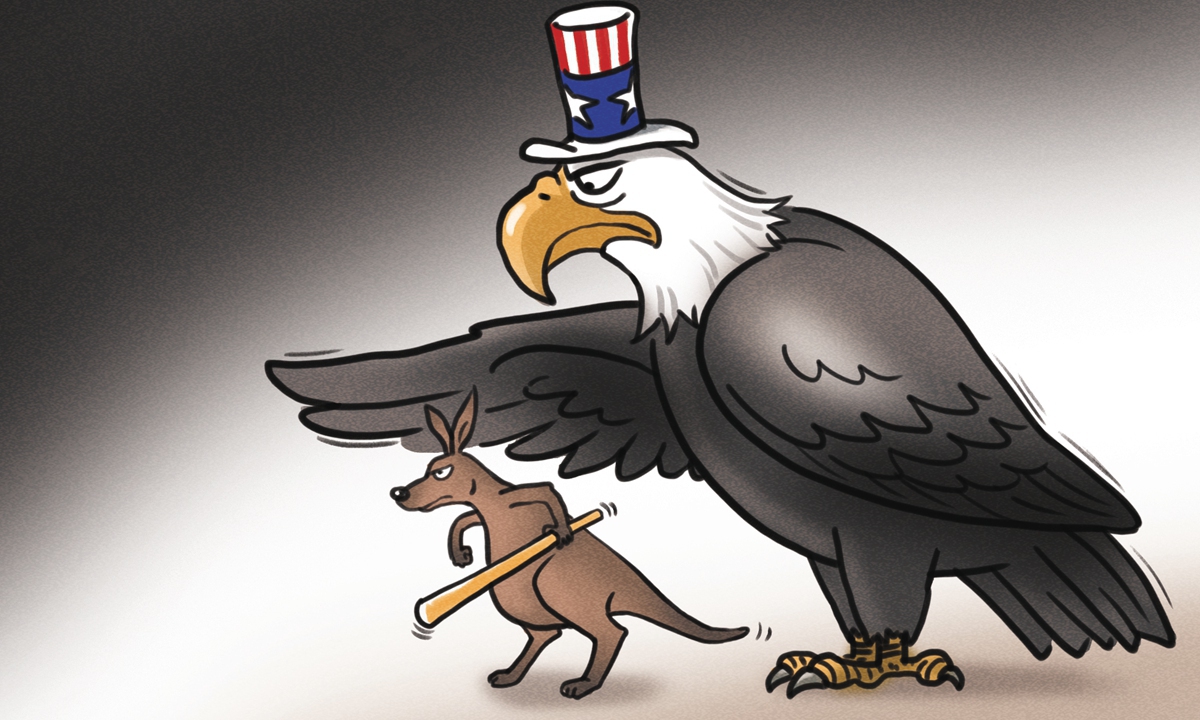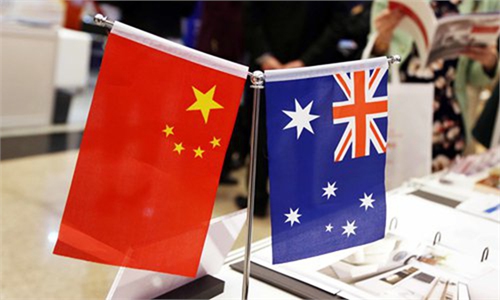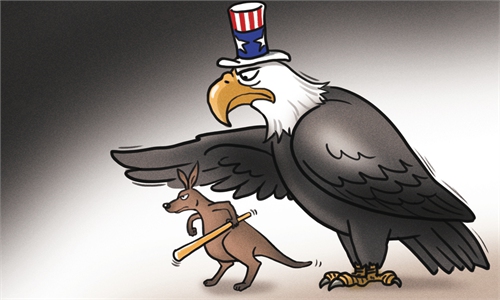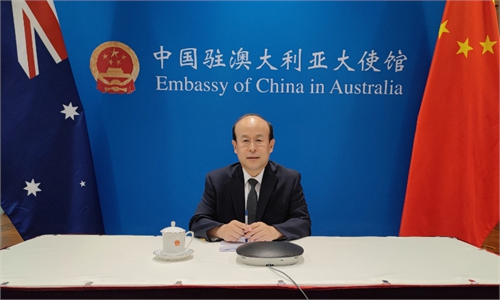Australia warned not to become US’ ‘spearhead’, as ‘2+2’ meeting goes beyond hyping 'China threats'

Australia US Illustration: Liu Rui/GT
Australia should not sacrifice its interests and autonomy for the sake of US hegemony, and China would not meet Australia's wishful thinking on cooperation if it is just siding with the US and challenging China's core interests, Chinese experts warned Wednesday, following the US-Australia agreement to increase the presence of US forces in Australia, citing so-called "threats from China."
Along with Australian defense chief Richard Marles, US Defense Secretary Lloyd Austin told a joint news conference Tuesday that the two sides agreed to increase the rotational presence of US forces in Australia, including rotations of bomber task forces, fighters and future rotations of US Navy and US Army capabilities.
At a routine press briefing on Wednesday, Chinese Foreign Ministry spokesperson Mao Ning denounced that the US has formed military alliances with some of its allies to stir up division and confrontation and undermine regional peace and stability. "It is unpopular and has no market," Mao said.
According to the release from the US Department of Defense, Austin also said the US and Australia will expand logistics and sustainment cooperation and look for ways to further integrate their defense industrial bases, while Marles said Australia and the US need to be "working closer together to enhance our military capability and to develop new technologies."
The two have also agreed to "invite Japan to integrate into our force posture initiatives in Australia," according to US Department of Defense.
Along with Britain's Defense Minister Ben Wallace, the two ministers will attend a meeting of AUKUS ministers on Wednesday in Washington with nuclear-powered submarines expected to be discussed, US media reported.
Analysts noted that the "2+2" ministerial consultations between the US and Australia were aimed at exchanging views and information in the past, but with the substantive actions this time, it signals that the mechanism would serve more to implement the "alliance" into pursuing concrete measures in the future.
"The meeting goes far beyond hyping 'China threats,' and Australia's role in America's Indo-Pacific strategy is becoming clearer and more specific," Chen Hong, director of the Australian Studies Center at East China Normal University, told the Global Times on Wednesday.
The first contingent of US troops was deployed in northern Australia's Darwin in 2012. In 2021, the US, UK and Australia created the AUKUS security deal, which will provide Australia with the technology to deploy nuclear-powered submarines. In October this year, the Financial Times disclosed that the Pentagon will deploy B-52 aircraft, which carry nuclear or conventional weapons, to Australia's Northern Territory.
Different from the past, the military link between the US and Australia is becoming increasingly substantive. The US aims to contain China's peaceful development by playing the "Taiwan card," while Australia plays a "proactive" role in the process, Chen said.
People have always described Canberra as Washington's "deputy sheriff" in the Asia-Pacific region, but now Australia is actually playing the role of a spearhead in some scenarios, Chen noted.
The announcement of the expansion in US-Australia military cooperation comes three weeks after formal talks between Australian Prime Minister Anthony Albanese and Chinese President Xi Jinping at the G20 Summit in Bali, which analysts believed would be a hopeful start to lift the countries out of the "diplomatic deep freeze" given the plunge in ties. But two weeks later, six Australian members of parliament from the Coalition and Labor visited China's Taiwan region and met secessionists on Sunday.
It is also worth noting that about three months before the latest Australia-US 2+2 ministerial meeting, Australia's defense chief reaffirmed the country's commitment to the one-China policy when speaking with local media in August.
"Australia's foreign policy is adventurism alongside opportunism, swinging between the two like a pendulum," Chen said. "When their economy is in trouble, they are eager to change the impasse with China and restore comprehensive economic and trade relations. However, when the US shifts its position or policies, Australia expresses support almost without exception."
Ning Tuanhui, an assistant research fellow at the China Institute of International Studies, told the Global Times on Wednesday that the US is trying to mobilize its allies against China, and that Canberra is an important pawn for Washington.
The idea of enhancing US military deployment and presence in Australia is aimed at encouraging Australia against China. It would also further increase US' strategic hold on Australia, so the country will be closely dependent on the US militarily and strategically, Ning added.
"The higher the US military presence in Australia is, the weaker Australia's strategic autonomy," Ning said, "When it comes to strategic weapons such as nuclear submarines and bombers, the US will certainly not allow Australia to dominate, and Australia may not even have a say in it."
"China has stressed on many occasions that the one-China principle is a red line that cannot be crossed. China will defend its sovereignty and territorial integrity at all costs. This is unshakable," Chen said, noting that it is a pointless act of adventurism to sacrifice Australians' interests for the sake of US hegemony.
Canberra must realize that China and Australia have no historical grievances, no territorial disputes, and both sides are economically complementary and share long-term mutually beneficial cooperation, Chen said.
Canberra needs to make sure it has the political wisdom and governance ability to properly manage differences, Chen said, noting that China would not meet Australia's wishful thinking on cooperation if it is just siding with the US and challenging China's core interests.




